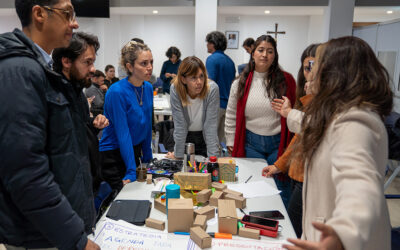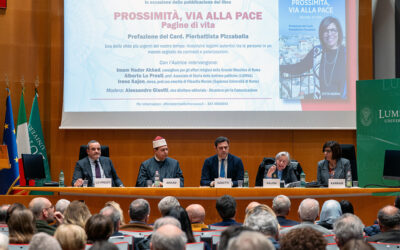 Dialogue will be the key contribution made by the Focolare at the Social Week in Reggio Calabria, Italy. Lucia Fronza Crepaz was involved in drawing up the document that will be presented by the Movement and, in Reggio, she and Luca Antonini will direct the study group on “institutional transition”. Mrs Fronza was deputy in more than one legislature and in the Focolare she is co-responsible for the secretariat of the New Humanity Movement.
Dialogue will be the key contribution made by the Focolare at the Social Week in Reggio Calabria, Italy. Lucia Fronza Crepaz was involved in drawing up the document that will be presented by the Movement and, in Reggio, she and Luca Antonini will direct the study group on “institutional transition”. Mrs Fronza was deputy in more than one legislature and in the Focolare she is co-responsible for the secretariat of the New Humanity Movement.
What did you experience when the Italian Bishops Conference asked the Focolare to be involved?
Happiness. At having been called together with everyone else. It was a very Catholic approach to call, or rather to go to each of the offices of the various associations, to gather their expectations, their charism, the different languages. We will bring what Chiara Lubich left to us: the culture of the Resurrection. Not so much in answer to bleak times, but as a hope which rests on the certainty of Jesus’ Pasch, which takes on vast horizons and foresees the possibility of a single human family as the goal of history. And so also for Italy, offering it in these 150 years of Unity, there is this new unity that is born from hope in the Risen Jesus.
From Chiara Lubich you inherited the exhortation to dialogue and to unity. She said: “All will be one if we will be one.” Dialogue in this society that seems so crushed and divided?
Dialogue as intended by Chiara is the reflection of the Trinitarian life of God who is one and three. We never ask why we don’t have an identity, but starting from the strong identity founded on the culture of the Resurrection, you can open a dialogue full of hope. If you aim at the novelty that you find in every person, in every culture, in every religion, you can draw out a thread of hope.
All of this takes place within the framework of the city, which you hold as the privileged setting. Is it also a place for dialogue?
We can look at it as the “landfill” as someone called it, or as a place of solitude, or we can look at the vocation of the city, its need to be where people can be identified. You might ask: What about the new people coming in? Their culture? They belong to the futures of our cities. If our horizons are those of a family of the world, then we can understand that what is happening is already part of this.
Your Focolare group suggest a city-wide laboratory, because the parish embraces only a portion of the city and the diocese crosses city borders. What is this city-wide laboratory?
Even the tiniest cities face all the challenges of globalization: different cultures and generations encountering each other. A city is already a laboratory. The grand theme of interreligious relations, for example, can also fall to a single Christian who meets a Muslim. This micro-dialogue shows that you can already begin – on a small scale – to give answers to the great questions that humankind is facing. This new project can initiate from a parish, from a mayor, from a group of citizens or a group of associations. The city, instead of being a place where everything is exasperating, can become the place of beginnings.
Source: article by Giovanni Ruggiero, Avvenire 24 September 2010




0 Comments